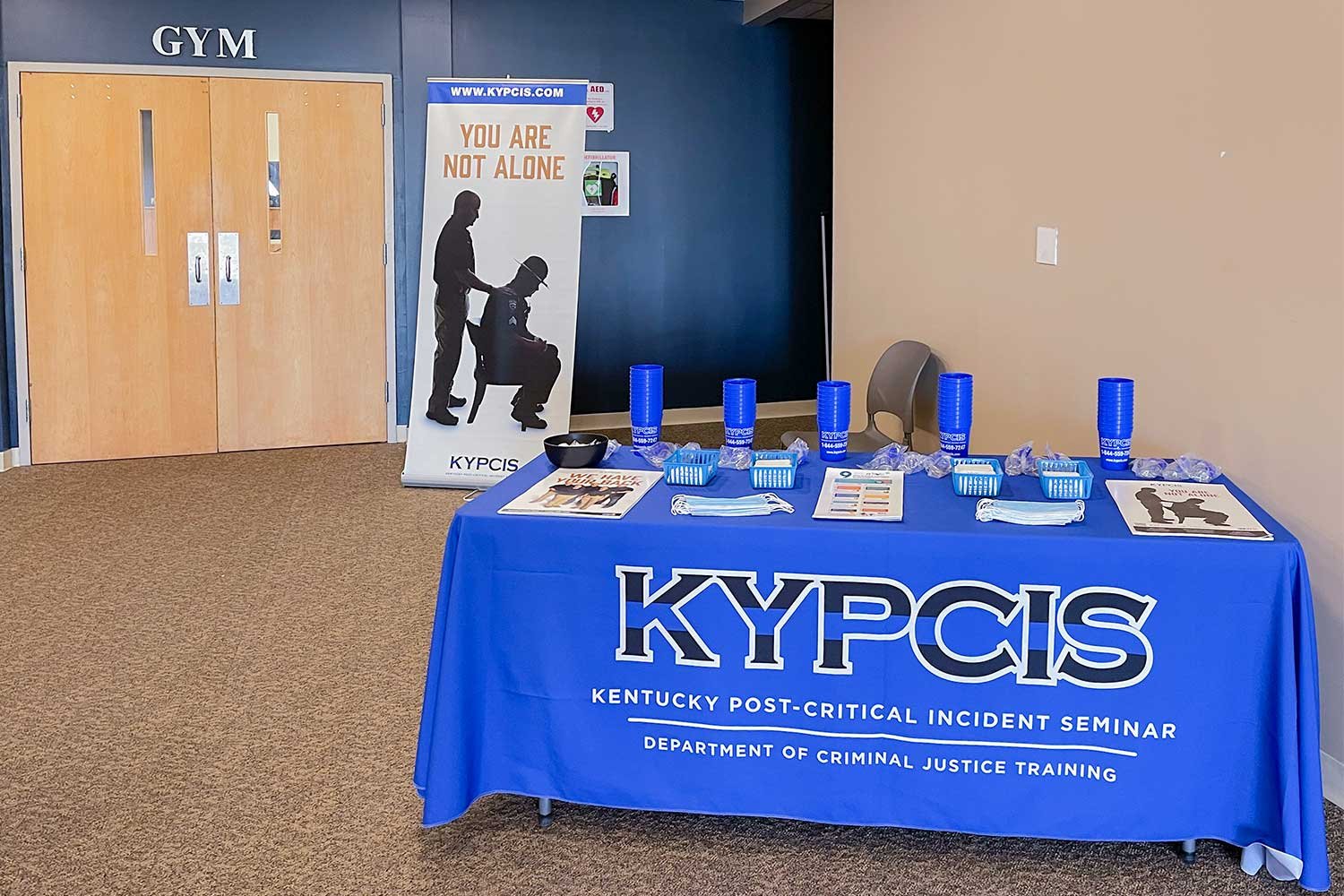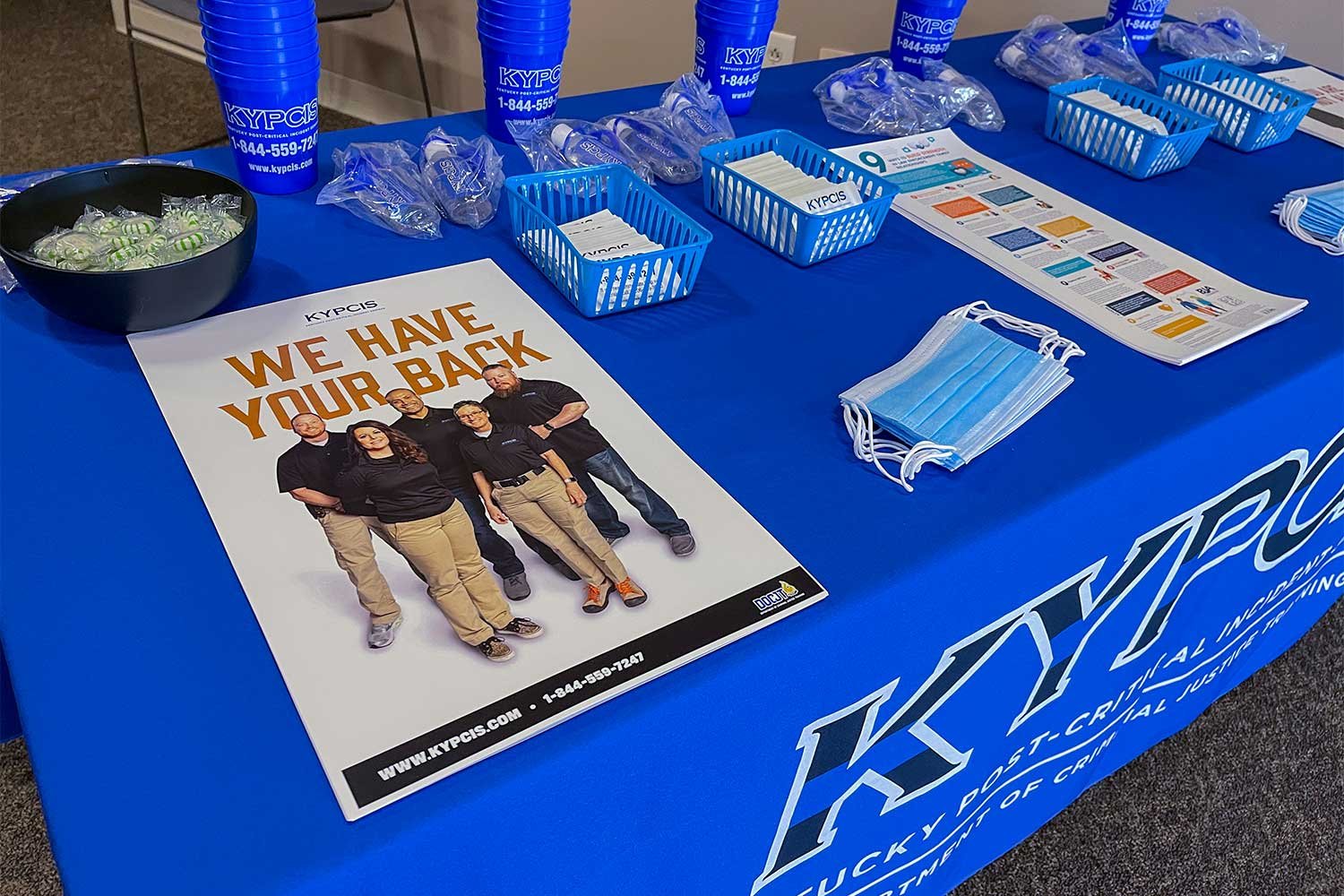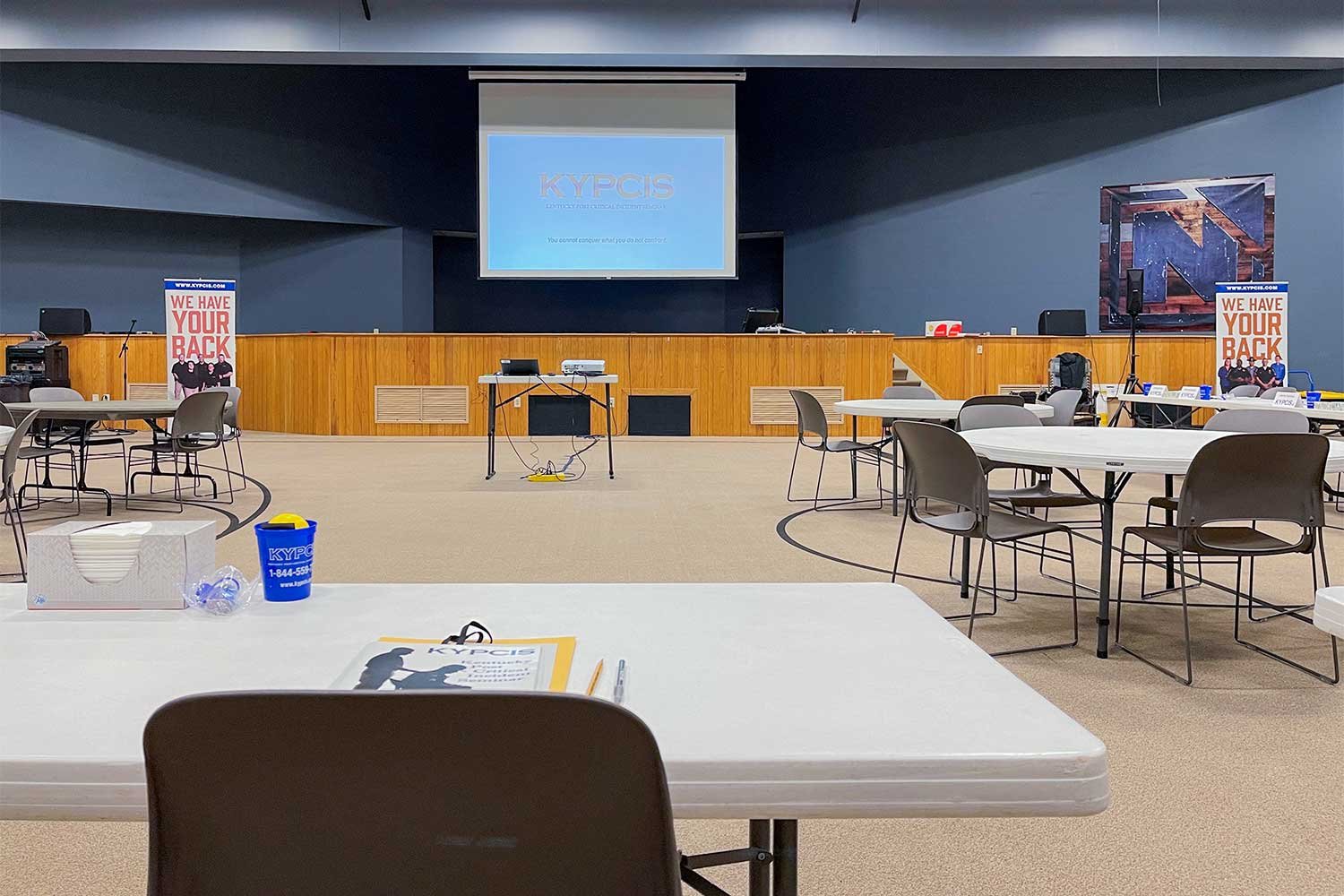A Positive Impact
PICTURED ABOVE
Department of Criminal Justice Resiliency Instructor Gabe Gillingham said a key to KYPCIS’s success is the small group sessions. (Photo provided)
Throughout their careers, law enforcement officers and public safety dispatchers often experience numerous critical incidents which impact them significantly. These vary in nature and can be defined by a single event, or the accumulation of multiple, negative career-related experiences.
Since 2017, the Department of Criminal Justice Training has offered a course designed for the well-being of officers and dispatchers. In March 2022, DOCJT completed its 20th Kentucky Post-Critical Incident Seminar (KYPCIS), and the program has made quite an impact on Kentucky’s law enforcement and public safety dispatchers.
“It’s really exciting to see how KYPCIS has evolved in just 20 classes to become well known and understood as a prominent mental health and wellness program for our state,” said DOCJT Commissioner Nicolai Jilek. “I look forward to seeing how its continued growth helps more law enforcement, dispatchers and significant others learn to thrive again after a critical incident.”
KYPCIS came about when two DOCJT instructors stepped up to the plate to see if something could be done to help those who have experienced a traumatic critical incident.
“We started (researching) it in 2015, and the first class went through in 2017,” DOCJT Resiliency Section Supervisor Larry Conley said. “(Former DOCJT instructor) Travis (Tennill) and I went to a PCIS in South Carolina in 2015 and we came back and began working on it. In September 2017, we ran the first KYPCIS.”
The September 2017 KYPCIS trained 37 peer team members.
“South Carolina trainers came up and ran that seminar to get our peers prepared,” Conley said. “In March 2018, we ran our KYPCIS on our own and had 33 attendees.”
Twenty classes later, the KYPCIS program has helped 542 Kentucky law enforcement officers, dispatchers and other family members properly manage the aftermath of critical incidents, receive peer support, learn coping strategies and more.
What is a Critical Incident?
A critical incident is any event that results in an overwhelming sense of vulnerability and loss of control. These include officer-involved shootings, being seriously injured on the job, high-speed pursuits that end in tragedy, events that bring prolonged and critical media attention, personal tragedies, and the like.
“A critical incident is anything that overwhelms your ability to cope,” Conley explained. “A critical incident is different for every individual. What is traumatic for one may not be traumatic for another. It depends on the individual.”
Additionally, a critical incident doesn’t have to be a single event. Conley said it could accumulate throughout an officer or dispatcher’s career and build up over time.
““A critical incident is anything that overwhelms your ability to cope.” ”
What is KYPCIS?
KYPCIS is a three-day seminar modeled after highly successful programs developed by the FBI and South Carolina. The seminars are led by mental health professionals trained to work with peace officers and driven by a team of law enforcement and dispatch peers who have experienced their critical incident and received training in Critical Incident Stress Management.
A key element in the course are small group sessions, said DOCJT Resiliency Instructor Gabe Gillingham.
“Much of the healing happens in a small group,” Gillingham said. “Those groups can get very emotional because there is that connectedness.”
The small groups are broken down into the type of critical incident the attendee experienced. For example, those involved in an officer-involved shooting would be in a group with others who have experienced similar trauma. If a person is experiencing cumulative effects of on-the-job stressors, they would be in a separate group.
“The exception of that was spouses and dispatchers,” Conley said. “It didn’t matter what their event was. Spouses are grouped together, and dispatchers are gathered together separately.”
But through the course of time and completing several KYPCIS classes, DOCJT’s staff began to realize that if a dispatcher’s trauma involved shootings where they were working the radio, then they needed to be broken down into groups that had experienced similar situations, as well.
“The concern we had was they wouldn’t feel comfortable in a room with a bunch of officers,” Conley said. “We were trying to create a productive environment for them. There was a seminar where there were a bunch of dispatchers, and they were added to a mix of officers and dispatchers. It worked out great.
“That is a fine example of the progression of the program,” he continued. “There was a benefit of putting them together, and (officers and dispatchers) were able to see it from one another’s perspective.”
DOCJT Resiliency Instructor Sarah Powell, a former dispatcher in Anderson County, agreed.
“They see both sides, and it’s eye-opening for the dispatchers and the officers,” she said. “They are able to find some relief from what they’ve been carrying all these years.”
Powell said that through 20 classes, 72 public safety dispatchers have gone through the program.
The three-day seminar also offers attendees help from mental health professionals (MHP).
The mental health professionals offer instruction blocks about grief, relationships, medications, and stress management. Additional one-on-one therapy is available for those with identified needs. Peer law enforcement and dispatch team members instill trust, break down stigma and lead to officers and dispatchers who typically would not seek help getting the assistance they need and deserve.
When the program first began in 2017, there were five MHPs who volunteered their services. In December 2019, DOCJT hired an in-house, full-time MHP in Angela Childers.
“Her coming on board was due to legislative support and them giving us our own KRS for the expansion and development of the Law Enforcement Professional Development and Wellness Program,” Gillingham said. “The need was seen for us to have a mental health professional on staff. She has taken that clinical director role for PCIS.”
Support for the Program
Since its inception in Kentucky, KYPCIS has been met with open arms in the law enforcement and public safety community.
“It’s great because officers can come in and talk about stuff that affects them on duty or any issues they’re dealing with before (duty),” said Detective Daniel Goldberg with the Jeffersontown Police Department. “Officers usually peel back the onion and find out other stuff bothering them that they didn’t even know about.”
Goldberg, who serves as a peer, said since the program’s inception, he’s seen a major difference in officers who have attended.
“I’ve seen guys who’ve come to the program that are pretty much at the bottom of the barrel,” he said. “They’ve gone through it and come back as peers themselves and excelled in their career. There have been guys whose supervisors knew them once as good officers who’ve had issues, but now they are firing on all cylinders, smiling, and doing stuff with their families. I’ve seen it full circle with many people.”
Bowling Green Deputy Chief Penny Bowles lauded the efforts of agencies that support the KYPCIS program.
“Police Departments and academies spend countless hours preparing officers for the skills required to be a police officer,” Bowles said. “Some agencies may have blocks of instruction about what an officer will go through immediately following a critical incident and offering Employee Assistance Programs and other services. Once the officer is cleared to return to duty, they may need further assistance weeks and months following their critical incident. Having programs for officers to attend after a critical incident allows them additional resources and peer support to assist in being healthy, happy, productive officers and family members in their respective communities.”
Conley said seeing how the program has evolved and its support has been incredible.
“The response and acceptance, not just by police officers and dispatchers, but also the state General Assembly, state and local elected officials, administrations at DOCJT and the community has been incredible,” Conley said. “This has gone all the way up to the hall of Congress. Congress has looked at the issue of mental health with police officers. What we’ve been able to do with the program and provide to people has far exceeded our expectations.”
Data Tracking
KYPCIS is quickly establishing a track record of being a positive force in helping officers and dispatchers with their mental health needs.
Two surveys are conducted during the course, and three additional surveys are completed at the three-months, six-months, and 12-months post-seminar.
These surveys collect information on symptoms of depression, anxiety, post-traumatic stress, burnout, turnover intentions, and relationship satisfaction.
Before receiving counseling, treatment, or training at KYPCIS, more than half (54%) of the officers and dispatchers are experiencing clinical-level symptoms of post-traumatic stress.
After completing KYPCIS, the proportion of participants experiencing PTS symptoms is reduced to 25%. PTSD symptoms are statistically reduced after participation in the KYPCIS.
One hundred percent of officer and dispatcher participants would recommend the KYPCIS to a colleague, according to the surveys.
Another telling stat is that many who attend KYPCIS eventually become peer team members.
“We have more than 40 peers,” Gillingham. “They want to pay it forward, so they come back to help.”








